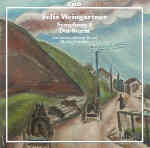I enjoyed the first volume in this series very much, and this next installment continues the favorable impression. Felix Weingartner was a symphonist in the conservative tradition of Mendelssohn (to say he was as modern as Brahms might be pushing it), but he was a very good one. He respected the distinction between “programmatic” and “absolute” music, and so in The Tempest there are colorful touches of percussion and harp, while the symphony features the standard romantic orchestra with no extras. What matters more, though, is the fact that Weingartner wrote good tunes (the lyrical second subject in the overture, for example), and in both the symphony and the serenade he imbues his music with a pastoral freshness that’s quite fetching.
Written in 1916, there’s little in the Fourth Symphony to suggest the ongoing war or the composer’s own straightened circumstances–merely the occasional dark shadow passing over the music’s generally sunny countenance. Is this emotional denial, or simply a celebration of a beautiful and civilized tradition? These very persuasive peformances from conductor Marko Letonja and his Basel orchestra, warmly recorded in both stereo and multichannel formats, let you be the judge.
































